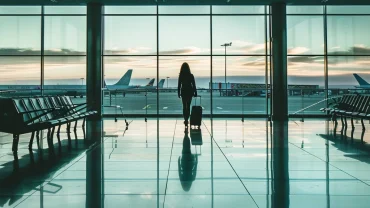Can flight ticket be preponed? Unraveling Time: The Prospects and Challenges of Preponing Flight Tickets
Introduction:
The thrill of planning a journey is often accompanied by the anticipation of the adventure that lies ahead. However, life’s dynamics may prompt the desire to shift gears and advance travel plans. In this article, we explore the concept of preponing flight tickets—an intricate dance with time that involves understanding airline policies, navigating unforeseen circumstances, and embracing the evolving landscape of travel adaptability.
The Peculiar Nature of Preponing:
The question of whether flight tickets can be preponed introduces a unique set of considerations. While the travel industry has traditionally been structured around fixed schedules and bookings, the concept of preponing challenges the conventional notions of itinerary modifications. The ability to shift travel dates earlier, commonly known as preponing, is a topic that involves a delicate balance between passenger needs and airline operational constraints.
Understanding Ticket Types:
The feasibility of preponing a flight is closely tied to the type of ticket a passenger holds. Airlines typically offer two main categories: refundable and non-refundable tickets. Refundable tickets, though often more expensive, afford greater flexibility and may allow for changes to the travel date with minimal hassle. Non-refundable tickets, however, are usually more restrictive, and changes may involve fees or limitations.
Navigating Refundable Tickets:
For travelers with refundable tickets, the process of preponing is generally more straightforward. Many airlines allow changes to the travel date, time, or even the destination with minimal fees for refundable fare categories. However, it’s crucial to review the specific terms and conditions associated with the refundable ticket, as policies can vary among airlines.
Challenges with Non-Refundable Tickets:
Preponing non-refundable tickets can pose challenges due to the inherent restrictions associated with this ticket type. Non-refundable tickets typically come with penalties for changes, and in some cases, changes may not be allowed at all. In situations where flexibility is paramount, travelers may need to explore options provided by the airline, such as flexibility programs or rebooking options, which may incur additional fees.
The Role of Clear Communication:
If the need to prepone a flight arises, clear communication with the airline is crucial. Contacting the airline’s customer service directly allows travelers to inquire about the specific policies governing preponing, explore available options, and understand any associated fees. Being transparent about the reasons for the change and providing ample notice can contribute to a smoother process.
The Evolving Landscape of Travel Flexibility:
In recent times, the travel industry has witnessed a notable shift towards more flexible policies. Airlines, recognizing the unpredictable nature of travel, have introduced initiatives to accommodate changes more seamlessly. Some have implemented no-change-fee policies, allowing passengers to prepone or postpone without incurring additional charges. This shift reflects a growing acknowledgment of the need for adaptability in response to dynamic circumstances.
The Impact of Operational Considerations:
While the desire to prepone a flight may be driven by personal circumstances or the pursuit of spontaneity, the operational considerations of airlines play a crucial role in determining the feasibility of such changes. Airlines operate on intricate schedules and need to manage factors like aircraft availability, crew scheduling, and airport slot allocations. These operational constraints can pose challenges when passengers seek to alter their travel dates on short notice.
Flexibility Programs and Fare Differences:
In response to the evolving expectations of travelers, some airlines have introduced flexibility programs that allow passengers to make changes to their bookings, including preponing, without incurring change fees. However, these programs may come with conditions, such as specific time frames for changes or limitations on the number of modifications allowed.
Additionally, when preponing a flight, passengers may encounter fare differences. If the new date or time falls within a fare category with higher prices, travelers may need to cover the additional costs. Understanding these potential financial implications is essential for those considering the option to prepone.
Digital Solutions for Seamless Changes:
Advancements in technology have played a significant role in streamlining the process of modifying travel plans. Many airlines now offer online platforms and mobile apps that empower passengers to initiate changes to their itineraries with ease. This digital transformation has not only made the prepone process more accessible but has also allowed for greater self-service, reducing the reliance on traditional customer service channels.
Navigating Unforeseen Events:
The need to prepone a flight can arise from various unforeseen events, such as family emergencies, sudden work commitments, or changes in health. In such cases, the ability to swiftly adjust travel plans becomes a valuable lifeline for passengers. Airlines, recognizing the human side of these scenarios, may exercise flexibility and understanding, particularly when faced with genuine and time-sensitive circumstances.
The Future of Preponing in Travel:
As the travel industry continues to evolve, the future may bring further enhancements to the flexibility and adaptability of flight itineraries. Technological innovations, coupled with a growing emphasis on customer-centric approaches, could lead to more streamlined processes for modifying travel plans, including preponing.
In Conclusion:
The intricate dance of preponing flight tickets intertwines personal desires, operational realities, and the evolving landscape of the travel industry. Whether prompted by spontaneity, unforeseen events, or a desire for flexibility, the ability to prepone a flight reflects the delicate balance between passenger needs and the operational intricacies of airlines. As travelers continue to seek new horizons, the question of preponing flights becomes not just a logistical consideration but a dynamic aspect of the ever-evolving journey through the skies.



Comment (0)